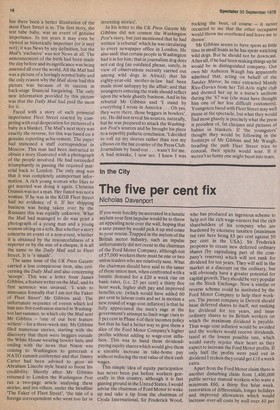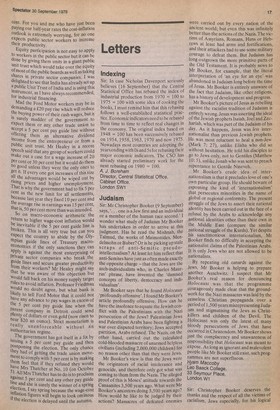In the City
The five per cent fix
Nicholas Davenport
If you were forcibly incarcerated in a lunatic asylum your first impulse would be to throw an appealing note over the wall, hoping that a sane passer-by would pick it up and come to your rescue. Trapped in the asylum of the British motor industry, such an inpulse unfortunately did not occur to the chairman of the Ford Motor Company, although out of 57,000 workers there must be one or two union leaders who are relatively sane. What the chairman should have said to the saner of these union men, when confronted with a lunatic demand for a £20 a week rise on basic rates, (i.e. 25 per cent) a thirty five hour week, higher shift pay and improved benefits etc. (which would have added 60 per cent to labour costs and set in motion a new round of wage-cost inflation) is that he fully appreciated the men's rage at the government's attempt to limit wage rises to 5 per cent in Phase 4 of their incomes policy but that he had a better way to give them a slice of the Ford Motor Company's higher profits without adding to wage-cost inflation. This was to hand them dividendpaying equity shares which would give them a sizeable increase in take-home pay without reducing the real value of their cash wages.
This simple idea of equity participation has never been put before workers generally in this country, although it is fast gaining ground in the United States. I would advise the chairman of Ford Motor to wake up and take a tip from the chairman of Croda International, Sir Frederick Wood, who has produced an ingenious scheme to help not the rich wage-earners but the rich shareholders of his company who are burdened by excessive taxation (maximum tax rate here being 83 per cent against 50 per cent in the USA). Sir Frederick proposes to create new deferred ordinary shares (by capitalising part of the company's reserves) which will not rank for dividend for ten years. They will sell in the market at a discount on the ordinary, but will obviously have a greater potential for capital growth. They should be very popular on the Stock Exchange. Now a similar or reverse scheme could be instituted by the Ford Motor Company to help their workers. The parent company in Detroit should issue deferred shares to itself, not ranking for dividend for ten years, and issue ordinary shares to its British workers on which the maximum dividend is payable. Thus wage-cost inflation would be avoided and the workers would receive dividends, taxed at the lowest possible rate, which would surely rejoice their heart as they expect to increase the Ford Motor profits. If only half the profits were paid out in dividend I reckon they could get fl 0 a week extra.
Apart from the Ford Motor claim there is another disturbing claim from 1,400,000 public service manual workers who want a minimum £60, a thirty five hdur week, restoration of differentials, longer holidays and improved allowances which would increase over-all costs by well over 40 per cent. For you and me who have just been PaYing our half-year rates the cost-inflation outlook is extremely worrying, for no one expects public sector workers to increase their productivity. Equity participation is not easy to apply to workers in the public sector but it can be done by giving them units in a giant public unit trust which would take over the equity of most of the public boards as well as taking Shares in private sector companies. I was delighted to see that India has already set up a public Unit Trust of India and is using this instrument, as I have always recommended, for industrial financing. Mad the Ford Motor workers may be in demanding a £20 pay rise which will reduce the buying power of their cash wages, but it is surely madder of the government to expect them or any other trade union to accept a 5 per cent pay guide line without offering them an alternative dividend income from the entrepreneur or from a Public unit trust. Mr Healey in a recent Speech said that any group of workers could make out a case for a wage increase of 20 Per cent or 30 per cent but it would do them no good unless they were the only ones to get it. If every one got increases of this size all the advantages would be wiped out by rising prices and higher unemployment. That is why the government had to fix 5 per cent as the new limit for all settlements, because last year they fixed 10 per cent and the average rise in earnings was 15 per cent, that is, 50 per cent more than was intended. So on macro-economic arithmetic the return to higher wage-cost inflation would be inevitable if the 5 per cent guide line is broken. This is all very true but can you expect the country to abide by the Olympian guide lines of Treasury macroeconomics if the only sanctions they can apply is against the most enterprising of private sector companies who break the guide lines and secure greater productivity from their workers? Mr Healey might say that he was aware of this objection but Would fall back on his money supply target rules to avoid inflation. Professor Friedman Would no doubt agree, but what bank is likely to tell Ford Motor that it could not have any advance to pay wages in excess of the 5 per cent pay guide line when the parent company in Detroit could send Plenty of dollars or even gold (now risen to near '$20 an ounce). Strict monetarism iS really unenforceable without an authoritarian regime. The government has got itself in a fix by issuing a 5 per cent pay guide and then Postponing the election. The only chance they had of getting the trade union movement to comply with 5 per cent is by making them feel that if they refused they would have Mrs Thatcher at No. 10 (on October 5). All Mrs Thatcher has to do is to proclaim against 5 per cent and any other pay guide line and she is surely the winner of a spring election. I say spring because the wage-cost inflation figures will begin to look ominous if the election is delayed until the autumn.



































 Previous page
Previous page